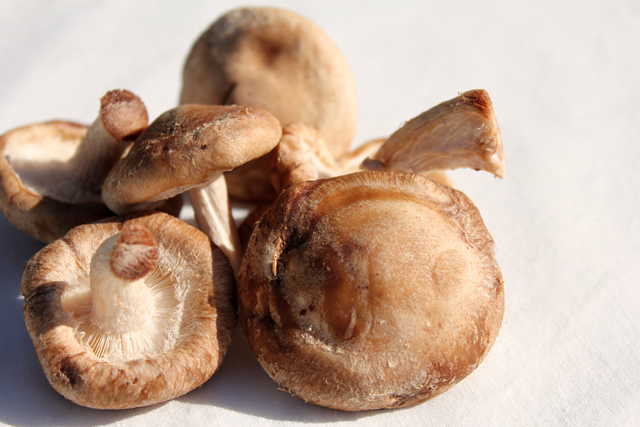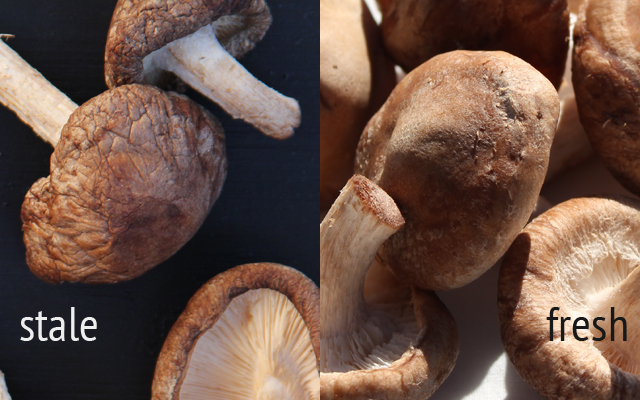

If mushrooms give you the skeevies because your parents always ruined half the pizza with the stumpy button type, then try a shiitake mushroom! Shiitake mushrooms have a unique flavor that woos your taste and your health. They are mini powerhouses of everything your health needs! They stimulate the immune system, fight off bugs, prevent cancer, promote cardiovascular wellness, and strengthen your vital reserves. You can even give them to Fido (in his dog biscuits)!
Cancer Fighting
Shiitake mushrooms are little cancer fighting mushroom heads. They fight the bad guys (cancer cells), protect the good guys (your liver cells), and call out the immune system forces in just the right way. A special carbohydrate found in shiitake mushrooms called lentinan has been shown to have anti-tumor activity for several different types of cancer.1 Shiitake mushrooms may have the potential to prevent the progression of liver cancer in those with chronic hepatitis.2
Chemotherapy Ally
Shiitake mushroom extracts, given both orally and intravenously, can decrease the adverse effects of chemotherapy through its effects on immune function and liver protection.2,6 Several research studies have found intravenous lentinan to buy time and prolong life in those with inoperable gastric cancer on chemotherapy.3,4 A Chinese study found that even when taken orally, as opposed to intravenously, it improved immune function and the quality of life in cancer patients undergoing chemotherapy.5
Useful in States of Immune Deficiency
Shiitake mushrooms are immune modulating, making them particularly useful when it comes to conditions where the immune system has been compromised. Research has already shown some of shiitake’s immune boosting activity in those with an HIV infection.4 There is also research showing its immune benefits in those undergoing cardiovascular bypass surgery.4
Natural Anti-Viral Agent
Research has shown its ability to fight against genital warts and hepatitis B. Shiitake is a gentle herb that works to tonify the body, so it works best for chronic viral conditions.
Heart Healthy Fungus
Shiitake mushrooms can lower cholesterol, inhibit platelet aggregation, and may be able to prevent further development of atherosclerosis. Eritadenine is the constituent in shiitake mushrooms that has been shown to lower cholesterol. You can protect your body from cardiovascular disease by making shiitake mushrooms a regular part of your diet.
Feed Your Immune System
Eating shiitake mushrooms regularly is a simple way to tonify your immune system through food. When purchasing shiitake mushrooms, look for fresh ones! Old mushrooms will be crinkly and wrinkly, but fresh ones will have a cap as smooth as a baby’s bottom. You can try them in my Tom Kha Gai Soup or you can throw them in your own soups, stir fries, and curries.

Cautions
If you have cancer or are on chemotherapy, do not use shiitake mushrooms medicinally until you consult your oncologist.
If you would like to start using shiitake mushrooms medicinally, please consult your naturopathic doctor. A licensed healthcare practitioner can tailor the dose according to your needs.
References:
1. Pizzorno, Joseph. Pizzorno: Textbook of Natural Medicine, 3rd ed. Churchill Livingstone, 2006.
2. Yagi K: Liver protective effect of Lentinula edodes mycelia (LEM). Gan To Kagaku Ryoho. 2012 Jul;39(7):1099-102.
3. Nakano H, Namatame K, Nemoto H, et al: A multi-institutional prospective study of lentinan in advanced gastric cancer patients with unresectable and recurrent diseases: Effect on prolongation of survival and improvement of quality of life. Hepato-Gastroenterology 46:2662-8.
4. Yarnell, Eric. Lentinula edodes Monograph. Bastyr University 2007.
5. Yamaguchi Y, Miyahara E, Hihara J: Efficacy and safety of orally administered Lentinula edodes mycelia extract for patients undergoing cancer chemotherapy: a pilot study. Am J Chin Med 2011;39(3):451-9.
6. Okuno K, Uno K: Efficacy of orally administered Lentinula edodes mycelia extract for advanced gastrointestinal cancer patients undergoing cancer chemotherapy: a pilot study. Asian Pac J Cancer Prev 2011;12(7):1671-4.






